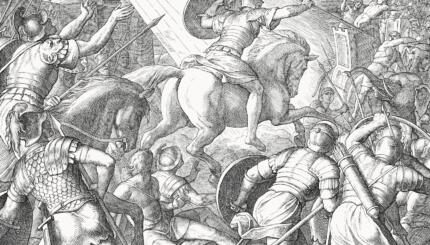As the eight days of Chanukah wind down, I am thinking of a question I posed as the festival began – who is the real hero of the story? When I asked this question of a class at the synagogue, I was not surprised at the first response: the oil. We then had a spirited discussion about the other possible heroes and realized we didn’t have a clear-cut conclusion.
Now, a week later, I realize why.
First, let’s talk about the oil. How could the oil be a hero? I admit to frustration for the way this story is told and passed from one generation to the next. With such a powerful story of Jewish survival, resting on guts and smarts and passionate commitment to the Jewish people, the watered-down version of the story that leaves out the essential message is more than a disappointment. It is a huge missed opportunity to reinvigorate pride and commitment to covenantal Judaism and the Jewish people.
Then there is the obvious second choice for the hero: Judah Maccabee and his band of warriors who fought valiantly to defeat an oppressive tyrant who threatened Jewish sovereignty in the land of our ancestors, and crushed Jewish learning and devotion during a time of confusion and change. “The Maccabees”, as they came to be known, saved Torah and the Jewish people. While this heroism inspires our generation, it still does not define us. Jews outside of Israel do not take up arms to defend the right to be Jews. And we pray for a time when Jews in Israel no longer need to do so as well.
There are the mythic heroes, not as often recalled. Hannah and her seven sons, a story of a mother who witnesses the martyrdom of her sons one after the other until her own death, has been an inspiring story for generations of Jews who were disempowered and persecuted, sometimes facing martyrdom themselves. Given the choice between eating pork/worshipping idols or death, Hannah’s family gives their lives rather than giving in. Visiting a typical “Jewish deli/kosher style” restaurant (as is common in Northern New Jersey) that boasts matzah ball soup alongside bacon and eggs, it seems clear that few Jews are motivated by Hannah’s sons’ passion for keeping the commandments as such. Nor are American Jews afraid that we must be prepared to give our lives to save Judaism itself.
Then there is the mythic Judith of the extra-biblical Apocrypha, who single-handedly saves the Jewish community by seducing and then beheading the general Holefernes, whose army is threatening the Jewish community. Judith’s story is great fodder for feminists at this time of year, the counterpoint to Judah Maccabee, and indeed an inspiring heroine. But with the memory of physical threat to Jewish survival fading for younger Jews, Judith’s courageous story (though a bit barbaric) is relegated to an interesting past with little connection to the present.
For American Jews, a new model is needed. Who is our hero?
In North American today, the hero of Chanukah is the person who raises Jewish children in a secular world and teaches them to love and cherish the blessing of being a member of the Jewish people. This hero uses the American blessing of individual empowerment to better the Jewish experience for their family and for all Jews. Embracing both the American and the Jewish civilizations in which they live, this hero teaches their children to recognize and honor the integrity of Jewish distinctiveness. This hero appreciates and honors the value of other religious traditions and people of faith, but cherishes the primacy of their Jewish identity. This hero demonstrates love for Jewish wisdom and ideals, culture and customs, by creatively, lovingly, energetically, and thoughtfully infusing contemporary Judaism into their home.
This is our new Chanukah hero, fighting against the forces of assimilation by embracing and shaping Judaism for themselves and the next generation. As I look around at my community, I see many Chanukah heroes. And that is the miracle of Chanukah.
Torah
Pronunced: TORE-uh, Origin: Hebrew, the Five Books of Moses.



